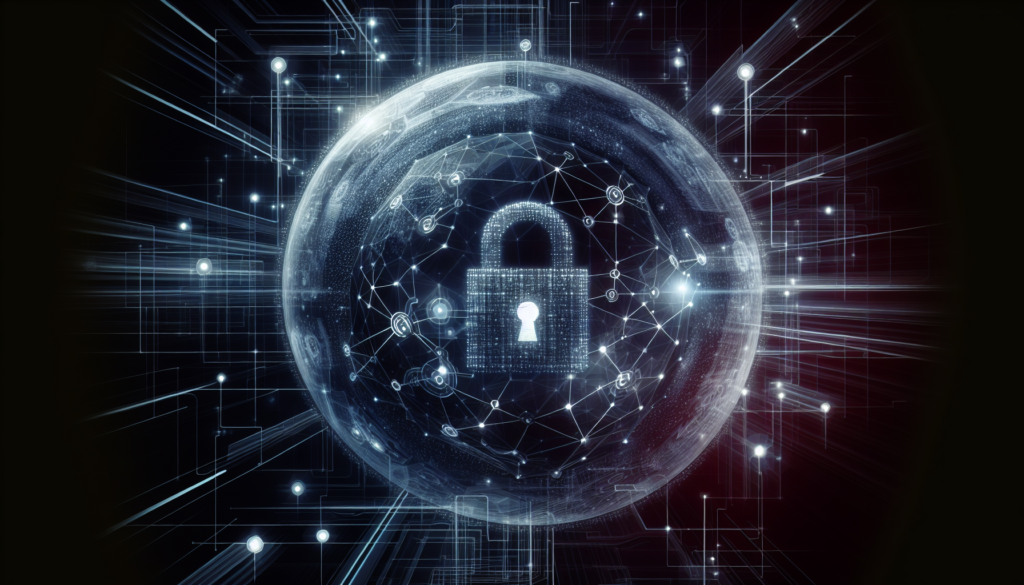Imagine living in a world where your private information is constantly at risk of being hacked or exploited. In today’s digital age, cybersecurity has become a crucial concern for individuals and organizations alike. But amidst the efforts to protect our data, have you ever wondered about the privacy rights that come with cybersecurity? This article explores the often overlooked aspect of how cybersecurity intersects with our right to privacy, and delves into the steps being taken to strike a balance between safeguarding our personal information and safeguarding our privacy. So, let’s uncover the intriguing world of privacy rights in cybersecurity.

The Definition of Privacy Rights
Privacy rights refer to the legal and ethical protections granted to individuals regarding the collection, use, and sharing of their personal information. These rights enable individuals to have control over their personal data and maintain their privacy and confidentiality. In the realm of cybersecurity, privacy rights play a crucial role in safeguarding sensitive information from unauthorized access, misuse, and exploitation.
The Importance of Privacy in Cybersecurity
Privacy is of paramount importance in the field of cybersecurity. It is not only about protecting individual rights but also about ensuring trust, confidence, and maintaining the integrity of online platforms and services. Privacy safeguards encourage individuals to share their personal information, conduct online transactions, and engage in digital activities without the fear of unauthorized access or malicious use. Privacy rights enhance cybersecurity by establishing a secure and reliable digital environment where individuals can freely express themselves, share information, and interact with others.
Legal Framework for Privacy Rights
General Data Protection Regulation (GDPR)
The General Data Protection Regulation (GDPR) is a comprehensive data protection law that came into effect in 2018, covering all European Union (EU) member states. The GDPR aims to strengthen individuals’ privacy rights in the digital age and regulate the processing of their personal data. It sets forth strict guidelines for organizations regarding data collection, storage, usage, disclosure, and transfer. The GDPR grants individuals various rights, such as the right to access their data, the right to be forgotten, and the right to data portability, empowering them to have control over their personal information.
California Consumer Privacy Act (CCPA)
The California Consumer Privacy Act (CCPA) is a state-level privacy law that was enacted in 2018 and went into effect on January 1, 2020. The CCPA enhances privacy rights for California residents and imposes certain obligations on businesses that collect, share, or sell consumers’ personal information. It grants consumers the right to know what personal information is being collected about them, the right to opt-out of the sale of their data, and the right to request the deletion of their personal information. The CCPA also imposes strict data breach notification requirements on businesses.
Health Insurance Portability and Accountability Act (HIPAA)
The Health Insurance Portability and Accountability Act (HIPAA) is a federal law in the United States that safeguards individuals’ health information. HIPAA applies to covered entities, such as healthcare providers, health plans, and healthcare clearinghouses, as well as business associates that handle protected health information (PHI). HIPAA establishes privacy and security rules for the protection of PHI, requiring entities to implement administrative, physical, and technical safeguards to ensure the confidentiality, integrity, and availability of individuals’ healthcare data.
Electronic Communications Privacy Act (ECPA)
The Electronic Communications Privacy Act (ECPA) is a federal law in the United States that governs the interception, access, and disclosure of electronic communications. The ECPA regulates the privacy of wire, oral, and electronic communications, including email, internet usage, and electronic messages. It sets forth guidelines for law enforcement agencies regarding the interception and access of electronic communications, requiring them to obtain search warrants or court orders in certain circumstances to preserve individuals’ privacy rights.
Privacy Rights in Cybersecurity Policies
Privacy rights play a crucial role in cybersecurity policies and practices. Organizations and institutions need to establish robust privacy policies and practices to ensure the lawful and ethical handling of personal information. These policies should outline the procedures for collecting, using, sharing, storing, securing, and disposing of personal data. Privacy policies should also inform individuals about their rights regarding their personal information and provide clear instructions on how to exercise those rights. By incorporating privacy rights into cybersecurity policies, organizations can foster a culture of privacy and ensure the protection of individuals’ data.

Collecting Personal Information
Types of personal information collected
Organizations collect various types of personal information from individuals, including names, addresses, email addresses, phone numbers, social security numbers, financial information, and login credentials. Additionally, organizations may collect other sensitive information, such as medical records, biometric data, and browsing histories.
Consent and disclosure
Obtaining individuals’ consent is a crucial aspect of collecting personal information. Organizations should clearly inform individuals about the purpose and scope of data collection and seek their explicit consent before collecting their personal data. Additionally, organizations should provide clear and concise disclosures regarding how personal information is used, shared, and protected.
Purpose limitation and data minimization
Organizations should adhere to the principles of purpose limitation and data minimization when collecting personal information. They should only collect and retain personal data that is necessary for the stated purpose and should not use personal information for any other purpose without obtaining explicit consent. Data minimization involves the practice of collecting only the minimum amount of personal information required to fulfill a specific purpose.
Storing and Securing Personal Information
Data protection measures
Organizations should implement robust data protection measures to safeguard personal information from unauthorized access, disclosure, alteration, or destruction. These measures may include access controls, encryption, firewalls, intrusion detection systems, and regular security assessments.
Encryption and anonymization
Encryption is a crucial technique for protecting personal information during storage and transmission. By encrypting data, organizations ensure that even if it is intercepted or accessed without authorization, it remains unreadable and unusable. Anonymization techniques, such as removing personally identifiable information, can also provide an additional layer of protection.
Data retention and deletion
Organizations should establish clear policies regarding data retention and deletion. Personal information should be retained only for as long as necessary to fulfill the stated purpose, and once the purpose is fulfilled, it should be securely deleted. Regular data audits and reviews should be conducted to identify and securely dispose of personal information that is no longer required.
Data Breaches and Privacy Rights
Notification requirements
In the event of a data breach, organizations are obligated to notify affected individuals about the breach, its potential impact, and the steps they can take to protect themselves. Timely and transparent notification empowers individuals to take necessary precautions and safeguards against potential harm or misuse of their personal information.
Compensation and liability
Depending on the jurisdiction and the nature of the data breach, individuals affected by a breach may be entitled to compensation. Organizations may also face legal and financial liabilities for failing to protect personal information adequately. These liabilities can include regulatory fines, damages, and reputational harm.
Prevention and response strategies
To prevent data breaches and protect privacy rights, organizations should implement robust security measures such as firewalls, intrusion detection systems, vulnerability scanning, and employee training programs. In the event of a breach, organizations should have well-defined incident response plans in place to minimize the impact, ensure timely notification, and mitigate further risks.
Law Enforcement and Privacy Rights
Data access and surveillance
Law enforcement agencies may seek access to personal information for legitimate investigative purposes. However, privacy rights should be balanced with law enforcement needs. Proper legal procedures, such as obtaining warrants or court orders, should be followed to ensure transparency, legitimacy, and accountability in accessing personal data.
Search and seizure
In cases where personal information is relevant to an investigation, law enforcement may conduct searches and seizures of electronic devices, servers, or other storage mediums. These activities should be conducted in accordance with applicable laws and regulations, with appropriate oversight and safeguards to protect individuals’ privacy rights.
Warrants and court orders
To access personal data protected by privacy rights, law enforcement agencies typically need to obtain warrants or court orders. These legal documents authorize the search, seizure, or access to personal information, ensuring that privacy rights are respected and preserved.
International Privacy Rights and Cross-Border Data Transfers
Privacy Shield and EU-US Data Protection Adequacy
The Privacy Shield is a framework that enables the transfer of personal data between the European Union (EU) and the United States while ensuring an adequate level of protection for individuals’ privacy rights. It provides a legal basis for organizations in the United States to receive and process personal data from the EU in compliance with GDPR requirements.
Standard Contractual Clauses (SCCs)
Standard Contractual Clauses (SCCs) are contractual provisions approved by the European Commission that enable the transfer of personal data from the EU to countries outside the EU that do not have an adequate level of data protection. SCCs are commonly used by organizations to ensure that privacy rights are protected when transferring personal data to jurisdictions with different privacy laws.
Binding Corporate Rules (BCRs)
Binding Corporate Rules (BCRs) are internal privacy policies and practices adopted by multinational organizations to ensure the protection of personal information when transferred between entities within the same corporate group. BCRs provide a framework for organizations to establish harmonized global privacy standards and ensure compliance with applicable privacy laws and regulations.
Emerging Technologies and Privacy Rights
Internet of Things (IoT)
The Internet of Things (IoT) refers to the interconnected network of devices and objects that collect and exchange data. While IoT technology offers numerous benefits, such as increased convenience and efficiency, it also raises concerns regarding privacy rights. As IoT devices often collect and transmit personal information, it is essential to establish privacy safeguards, such as encryption, user consent mechanisms, and transparent data handling practices.
Artificial Intelligence (AI)
Artificial Intelligence (AI) technologies, such as machine learning and automated decision-making systems, have the potential to impact privacy rights significantly. AI algorithms can process vast amounts of personal data to draw insights and make predictions. Privacy safeguards, such as data anonymization, privacy impact assessments, and algorithmic transparency, should be implemented to ensure that individuals’ privacy rights are respected in AI applications.
Biometrics
Biometric technologies, such as fingerprint or facial recognition, are increasingly being used for authentication and identification purposes. As biometric data is highly personal and permanent, privacy rights must be carefully considered. Organizations should implement strong security measures, obtain individuals’ informed consent, and establish clear policies regarding the collection, usage, and retention of biometric data.
Blockchain
Blockchain technology provides a decentralized and tamper-resistant framework for storing and transmitting data. While blockchain offers potential benefits in terms of data integrity and trust, it also raises privacy concerns. Organizations should carefully consider privacy implications when implementing blockchain solutions, such as ensuring data minimization, pseudonymization, and providing individuals with control over their personal information.
In conclusion, privacy rights are crucial in the field of cybersecurity to protect individuals’ personal information, maintain trust, and foster a secure digital environment. Legal frameworks, privacy policies, and robust security measures are essential for organizations to safeguard privacy rights. As technology continues to evolve, it is crucial to remain vigilant in upholding privacy rights in emerging technologies and cross-border data transfers. By respecting and protecting privacy rights, organizations can build trust, maintain compliance, and ensure the security and integrity of individuals’ personal information in the digital age.
